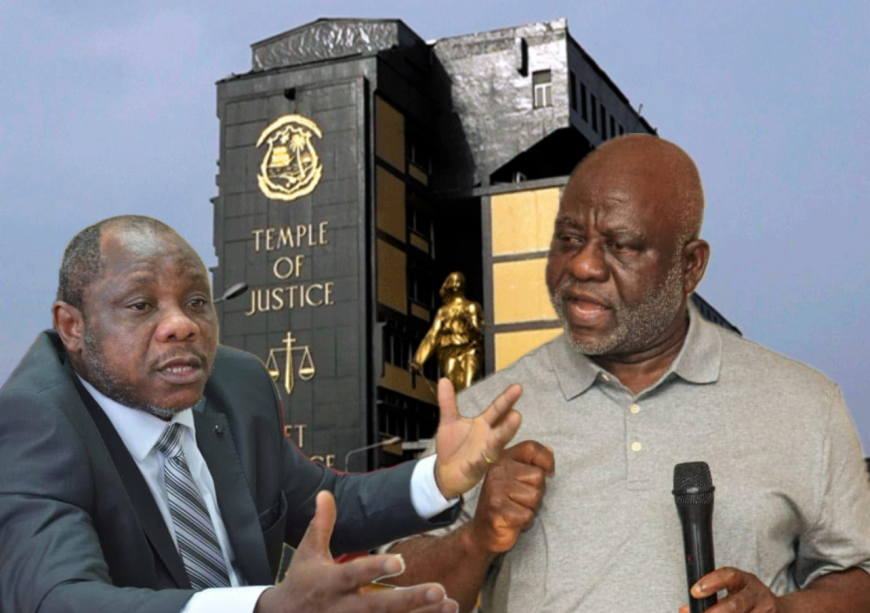Samukai’s Ghost Looms Over Tweah as Courts Reject Immunity Claims

Monrovia, Liberia – The recent ruling by Judge Roosevelt Willie in Criminal Court “C”, denying a motion to dismiss the indictment against former Finance Minister Samuel Tweah and others, echoes a key precedent set by the Supreme Court of Liberia in 2021, when former Defense Minister J. Brownie Samukai was convicted for unauthorized financial transactions.
The ruling in Tweah’s case underscores the judiciary’s evolving stance on financial misconduct within government ranks and raises broader questions about the extent of executive immunity, particularly regarding high-level officials who claim to have acted under presidential directives.
Similarities Between the Two Cases
Both cases center around unauthorized financial transactions involving public funds, with officials claiming that their actions were done in furtherance of national security interests.
The Samukai Precedent (2021 Supreme Court Ruling)
In 2021, the Supreme Court upheld the conviction of former Defense Minister J. Brownie Samukai, Joseph P. Johnson, and James Nyumah Dorkor for mismanaging funds from the Armed Forces of Liberia (AFL) pension account.
• The total amount misappropriated was US$1,147,656.35.
• The defendants argued that the funds were used for operational military expenses under the direct orders of then-President Ellen Johnson Sirleaf.
• The Supreme Court rejected this argument, ruling that even if the President had given such directives, it did not absolve the defendants of their fiduciary duty to refuse unlawful financial transactions.
• The court upheld their conviction and imposed a restitution plan, failing which they would be imprisoned.
This ruling sent a strong message that presidential directives cannot override statutory financial regulations.
The Tweah Case (Ongoing in 2024-2025)
In the case against former Finance Minister Samuel Tweah, prosecutors allege that between September 8-21, 2023, a total of L$1,055,152,540.00 and US$500,000.00 was transferred from the Central Bank of Liberia (CBL) to the Operational Accounts of the Financial Intelligence Agency (FIA) at the instruction of the Ministry of Finance and Development Planning (MFDP).
• Investigators found no documentation from the National Security Council, National Joint Security, or FIA to justify the transfer.
• The defendants argue that they acted under the authority of former President George M. Weah, claiming that immunity granted to the President extends to his agents.
• Judge Roosevelt Willie denied their motion to dismiss, ruling that the prosecution must be given a chance to prove that the officials acted outside their legal boundaries.
Key Legal Questions
Both cases hinge on the limits of executive immunity and whether government officials can escape liability by claiming to have acted under presidential orders.
1. Does Presidential Immunity Extend to Agents?
• Article 61 of the 1986 Liberian Constitution states that “The President shall be immune from any suits, actions, or proceedings, judicial or otherwise, and from arrest, detention, or other actions on account of any act done by him while President of Liberia pursuant to any provision of this Constitution or any other laws of the Republic. The president shall not, however, be immune from prosecution upon removal from office for the commission of any criminal act done while President.”
• The defense argues that this immunity should also apply to presidential agents and advisors.
• Judge Willie rejected this claim, ruling that officials must still be accountable for financial misconduct.
2. Does National Security Justify Unauthorized Financial Transactions?
• The NSRI Act of 2011 does provide some protection for members engaged in financial transactions related to national security.
• However, Section 7(c) of the NSRI Act states that officials must still provide proper financial accountability.
• Similarly, the Act establishing the FIA protects officials only if they acted in good faith, excluding cases of gross negligence, corruption, or malicious intent.
Defense Reaction: Accusations of Judicial Overreach
Following Judge Willie’s ruling, defense lawyer Cllr. Arthur Johnson fiercely criticized the decision, arguing that the judge had overstepped his authority.
“Today’s ruling shows that the judge has ascribed to himself an authority that he does not have. A trial court does not have the authority to interpret the Constitution—that authority is ascribed to the full bench of the Honorable Supreme Court,” Cllr. Johnson stated.
He further contended that national security matters should not be subjected to judicial review, warning that exposing financial details of security operations during an election year could have serious national implications.
“The courts shall refrain from conducting an inquiry on the basis that any attempt will compromise national security. Why should we be exposing national security operations, particularly financial expenditures that kept this country safe during elections?”
Judicial Trends: A Shift Toward Accountability
The 2021 Supreme Court ruling in Samukai’s case set a legal precedent that presidential directives cannot override financial laws.
Now, with Judge Willie’s ruling in Tweah’s case, Liberia’s courts are reinforcing this precedent, signaling a shift toward stricter accountability for government officials.
If Tweah and his co-defendants are convicted, it will further cement the principle that public officials cannot use executive immunity as a shield for financial misconduct.
What’s Next?
With the motion to dismiss denied, the case proceeds to full trial in Criminal Court “C.”
• The prosecution must now prove that the defendants engaged in unauthorized financial transactions outside their legal mandate.
• The defense will likely appeal to the Supreme Court, challenging the trial court’s jurisdiction.
• The case is expected to shape future interpretations of executive immunity, financial accountability, and national security protections.
As Liberia’s judiciary continues to evolve, this case, like Samukai’s before it, may redefine the limits of power and responsibility for government officials handling public funds.
What's Your Reaction?









































































